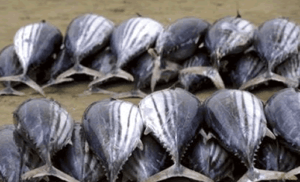NAFAG calls for stakeholder engagement to revive Ghana tuna industry
 The National Fisheries Association of Ghana (NAFAG) has urged the government to host a stakeholder engagement to develop strategies to revitalize the tuna industry, particularly pole and line fishing.
The National Fisheries Association of Ghana (NAFAG) has urged the government to host a stakeholder engagement to develop strategies to revitalize the tuna industry, particularly pole and line fishing.
Speaking at a day’s fisheries workshop for Ghana News Agency Tema Regional staff, Mr Richster Nii Amarh Amarfio, the NAFAG Secretary said such stakeholder engagement was urgently needed because only two pole and line tuna vessels were expected to remain in operation by 2023.
He noted that despite Ghana having 20 registered pole and line vessels, only five were now in service due to the significant operational costs associated with tuna fishing and management.
The workshop was part of the media platform dubbed: “Blue Gold: Ghana’s Economic Transformer,” initiated by the Ghana News Agency, to enable journalists to engage with players and other stakeholders in the blue economy space.
It is also to deepen the discussion on the blue economy and serve as the medium for stakeholders to engage the media to project things that happen within the sector.
The platform also links investors to the blue economy value chain, explores other opportunities within the space that are yet to be discovered, and assists policymakers in understanding the challenges confronting players in the blue economy.
He stated that most of the vessels were scrapped because they were older than 45 years, making management very expensive, and that the arbitrarily large increase in the licensing charge, along with the shortage of anchovies, which were used as bait to catch tuna, was destroying the sector.
Other difficulties included high cost of fuel and the payment of resources like water in dollars at Ghana’s ports.
Mr Amarfio pleaded with the government to meet with stakeholders to strategise on how the government could help Ghanaians expand their participation in the sector, as foreigners currently had a larger stake due to lack of finance.
The GTA advocated for the formation of proper fishing banks to support the industry, claiming that such a bank would have a better grasp of the industry and hence terms that would be commensurate with the sector’s unique difficulties.
He stated that such actions would assist the tuna business in contributing significantly to the economy, stating that the sector used to provide over 350 million US dollars yearly to the economy but had now diminished due to non-functioning vessels.
Source: GNA
